Introduction
A financial market is an aggregate of possible buyers and sellers of financial securities, commodities, and other fungible items and the transactions between them . Within the financial sector, the term "financial markets" is often used to refer just to the markets that are used to raise finance: the capital markets for long-term finance and the money markets for short-term finance (maturity up to one year).

Frankfurt Bond Market
The Frankfurt Bond Market is an example of a financial market that allocates capital.
Allocating Capital
One of the main functions of financial markets is to allocate capital. Capital markets especially facilitate the raising of capital while money markets facilitate the transfer of liquidity, matching those who have capital to those who need it. Financial markets attract funds from investors and channel them to enterprises that use that capital to finance their operations and achieve growth, from start-up phases to expansion--even much later in the firm's life. Money markets allow firms to borrow funds on a short-term basis, while capital markets allow corporations to gain long-term funding to support expansion.
Funds borrowed from the money markets are typically used for general operating expenses, to cover brief periods of illiquidity. When a company borrows from the primary capital markets, often the purpose is to invest in additional physical capital goods, which will be used to help increase its income. Financial capital is money used by entrepreneurs and businesses to buy what they need to make their products or provide their services. It can take many months or years before the investment generates sufficient return to pay back its cost, and hence the finance is long-term. Long-term capital can come in the form of shared capital, mortgage loans, and venture capital, among other types.
Without financial markets, borrowers would have difficulty finding lenders themselves. Intermediaries such as banks help in this process. Banks take deposits from those who have money to save. Many individuals are not aware that they are lenders providing capital, but many do lend money at least indirectly, for example when they put money in a savings account or contribute to a pension. Intermediaries like banks can then lend money from this pool of deposited money in the form of loans to those who seek to borrow. More complex transactions than a simple bank deposit require markets where lenders and their agents can meet borrowers and their agents, and where existing borrowing or lending commitments can be sold on to other parties. One example is the stock exchange, where a company can raise money by selling ownership shares to investors and its existing shares can be bought or sold.